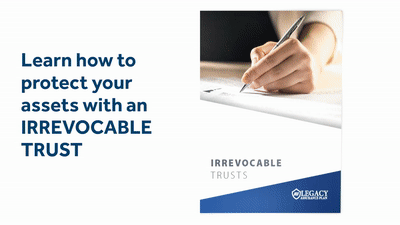An irrevocable trust is a powerful estate planning tool that can provide significant protection for your assets during your lifetime and after your passing. Unlike revocable living trusts, once established, an irrevocable trust is designed to be unchangeable without the beneficiaries' consent or court approval. This permanent status is the foundation of its effectiveness in asset protection and estate planning.
When you create an irrevocable trust, you transfer ownership of specific assets to the trust. These assets are no longer considered part of your personal estate, as the trust becomes the legal owner. This transfer of ownership is the key mechanism that allows irrevocable trusts to offer numerous advantages, including minimizing estate taxes, protecting assets from creditors and ensuring a smooth transfer of assets to your beneficiaries.
How do irrevocable trusts provide asset protection?
One of the primary benefits of an irrevocable trust is its robust asset protection capabilities. By transferring assets into the trust, you effectively remove them from your personal ownership, making them inaccessible to potential creditors, lawsuits and other legal claims.

This protection stems from the fact that once you transfer an asset to an irrevocable trust, you no longer own it – the trust does. As a result, if you face financial difficulties or legal challenges in the future, the assets held within the trust are generally shielded from these issues. This protection ensures that your assets are preserved for your intended beneficiaries, even in the face of unforeseen circumstances.
For example, if you're a professional in a high-risk field, such as medicine or law, an irrevocable trust can safeguard your assets from potential malpractice claims. Similarly, if you're concerned about future creditors or the possibility of divorce, an irrevocable trust can provide a layer of protection for your family's wealth.
What are the tax benefits of an irrevocable trust?
Irrevocable trusts offer significant tax advantages, making them an attractive option for individuals with substantial estates. The primary tax benefit is the potential reduction of estate taxes.
When you transfer assets to an irrevocable trust, you are effectively removing them from your taxable estate. This can lead to a substantial reduction in estate taxes upon your death, as the value of your taxable estate is decreased. For high-net-worth individuals, this tax saving can be substantial, potentially preserving millions of dollars for your beneficiaries.
It's important to note that tax laws are complex and subject to change. Working with an experienced estate planning attorney is crucial to maximize the tax benefits of an irrevocable trust while ensuring compliance with current regulations.
How are irrevocable trusts used in estate planning?

Irrevocable trusts play a vital role in comprehensive estate planning strategies. They offer a way to ensure your wishes are carried out precisely as you intend, even after you're gone. Here are some key ways irrevocable trusts are used in estate planning:
- Asset protection. As mentioned earlier, irrevocable trusts shield assets from creditors and legal judgments, ensuring your wealth is preserved for your beneficiaries.
- Tax planning. By removing assets from your taxable estate, irrevocable trusts can significantly reduce estate taxes, maximizing the wealth passed on to your heirs.
- Medicaid planning. For individuals concerned about long-term care and Medicaid eligibility, irrevocable trusts can be a valuable tool. By transferring assets to an irrevocable trust well in advance of needing Medicaid benefits, you can effectively "spend down" your assets while still ensuring their protection for your heirs.
- Special needs planning. If you have a family member with special needs, an irrevocable special needs trust can provide for their care without jeopardizing their eligibility for government benefits.
- Charitable giving. Irrevocable charitable trusts allow you to support causes you care about while potentially receiving tax benefits.
- Business succession planning. For business owners, irrevocable trusts can be used to facilitate smooth transitions of ownership and management.
By incorporating irrevocable trusts into your estate plan, you can ensure that your assets are distributed according to your wishes, protected from potential threats and optimized for tax efficiency.
What are the disadvantages of an irrevocable trust?


While irrevocable trusts offer numerous benefits, they also come with certain drawbacks that should be carefully considered:
- Loss of control. The primary disadvantage of an irrevocable trust is the loss of control over the assets once they're transferred into the trust. As the name suggests, these trusts cannot be easily modified or revoked without the beneficiaries' consent or court approval.
- Inflexibility. Once established, it can be challenging to adapt an irrevocable trust to changes in financial or personal circumstances. This lack of flexibility can be problematic if your situation or wishes change significantly over time.
- Complexity and cost. Setting up an irrevocable trust can be complex, often requiring the expertise of legal and financial professionals. This complexity can lead to higher upfront costs compared to other estate planning tools.
- Potential for errors. Due to their permanent nature, any mistakes made in the creation or funding of an irrevocable trust can have long-lasting consequences. It's crucial to work with experienced professionals to avoid costly errors.
- Income tax considerations. While irrevocable trusts can offer estate tax benefits, they may have less favorable income tax treatment compared to assets held personally or in a revocable trust.
Despite these disadvantages, for many individuals, the benefits of irrevocable trusts outweigh the drawbacks. The key is to carefully weigh your options and consult with experienced professionals to determine if an irrevocable trust aligns with your estate planning goals.
What types of irrevocable trusts are commonly used?

There are several types of irrevocable trusts, each designed to serve specific purposes in estate planning. Here are some of the most commonly used types:
- Life insurance trust. This trust is designed to hold life insurance policies. By removing the life insurance proceeds from your taxable estate, it can significantly reduce estate taxes.
- Charitable remainder trust. This trust allows you to donate assets to charity while retaining an income stream for yourself or other beneficiaries for a specified period. It offers potential income tax deductions and estate tax benefits.
- Generation-skipping trust. This trust allows you to transfer assets to your grandchildren (or even later generations) while potentially avoiding estate taxes at each generational level.
- Special needs trust. This trust is designed to provide for a beneficiary with special needs without jeopardizing their eligibility for government benefits.
- Qualified personal residence trust. This trust allows you to transfer your primary residence or vacation home to your beneficiaries at a reduced gift tax cost.
- Grantor retained annuity trust. This trust allows you to transfer appreciating assets to beneficiaries while retaining an annuity payment for a specified term.
- Irrevocable life insurance trust (ILIT). A specific type of life insurance trust that can provide liquidity to pay estate taxes and support beneficiaries.
Each of these trusts serves a unique purpose and can be tailored to fit specific estate planning needs. The choice of trust depends on your individual circumstances, financial goals and the needs of your beneficiaries.
How do I set up an irrevocable trust?
Setting up an irrevocable trust involves several steps and should be done with the guidance of an experienced estate planning attorney. Here's a general overview of the process:
- Determine your goals. Clearly define what you want to achieve with the trust. Are you primarily concerned with asset protection, tax benefits or providing for specific beneficiaries?
- Choose a trustee. Select a trustworthy individual or institution to manage the trust. This could be a family member, friend or professional trustee.
- Identify beneficiaries. Decide who will benefit from the trust. This could include family members, charities or other individuals or organizations.
- Draft the trust document. Work with your attorney to create the trust document. This legal document will outline the terms of the trust, including how assets should be managed and distributed.
- Fund the trust. Transfer ownership of the chosen assets to the trust. This may involve retitling assets, changing beneficiary designations or creating new accounts in the name of the trust.
- Obtain a tax ID. Apply for a tax identification number for the trust from the IRS.
- File necessary tax returns. Depending on the type of trust and its income, you may need to file annual tax returns for the trust.
Remember, once the trust is established and funded, it generally cannot be changed or revoked without court approval or the consent of all beneficiaries. Therefore, it's crucial to carefully consider all aspects of the trust before finalizing it.
Conclusion
Irrevocable trusts are sophisticated estate planning tools that offer significant benefits for those seeking to protect their assets, minimize tax liability and ensure their wishes are carried out precisely. While they require careful consideration due to their permanent nature and complexity, the advantages they provide – from asset protection and tax benefits to specialized planning options – make them valuable instruments in comprehensive estate planning.
The decision to establish an irrevocable trust should not be taken lightly. It requires thorough evaluation of your financial situation, long-term goals and family circumstances. Working with experienced legal and financial professionals is crucial to ensure the trust is properly structured and aligned with your objectives. While the initial setup may be complex and costly, the long-term benefits of asset protection, tax savings and peace of mind often justify the investment.



